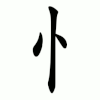忄
Appearance
| ||||||||
| ||||||||
Translingual
[edit]| Stroke order | |||
|---|---|---|---|

| |||
Glyph origin
[edit]Variant of 心 (“heart”), when used as left radical (compare 㣺).
Han character
[edit]忄 (Kangxi radical 61, 心+0, 3 strokes, cangjie input 竹卜 (HY), composition ⿰丿卜 or ⿻丨八)
- radical number 61
References
[edit]- Kangxi Dictionary: not present, would follow page 375, character 1
- Dai Kanwa Jiten: character 10297
- Dae Jaweon: page 701, character 2
- Hanyu Da Zidian (first edition): not present, would follow volume 4, page 2267, character 1
- Unihan data for U+5FC4
Chinese
[edit]| simp. and trad. |
忄 | |
|---|---|---|
| alternative forms | 㣺 | |
Pronunciation
[edit]- Mandarin
- (Standard Chinese)+
- Hanyu Pinyin:
- Zhuyin: ㄒㄧㄣ
- Tongyong Pinyin: sin
- Wade–Giles: hsin1
- Yale: syīn
- Gwoyeu Romatzyh: shin
- Palladius: синь (sinʹ)
- Sinological IPA (key): /ɕin⁵⁵/
- (Standard Chinese)+
Definitions
[edit]忄
- radical form of 心 (xīn).
Usage notes
[edit]Only used as a component in a character. Referred to as 豎心旁/竖心旁 (shùxīnpáng) 'standing heart radical' or 心部.
Japanese
[edit]Kanji
[edit]忄
- the left "heart" radical, called 立心偏 (risshinben)
Readings
[edit]- Kun: りっしんべん (risshinben, 忄)
Vietnamese
[edit]Han character
[edit]- This term needs a translation to English. Please help out and add a translation, then remove the text
{{rfdef}}.
Categories:
- CJK Unified Ideographs block
- Han script characters
- CJK Radicals Supplement block
- Han character radicals
- Translingual lemmas
- Translingual symbols
- Chinese lemmas
- Mandarin lemmas
- Chinese hanzi
- Mandarin hanzi
- Chinese terms with IPA pronunciation
- Chinese terms spelled with 忄
- Japanese kanji
- Japanese hyōgai kanji
- Japanese kanji with kun reading りっしんべん
- Vietnamese lemmas
- Vietnamese Han characters

